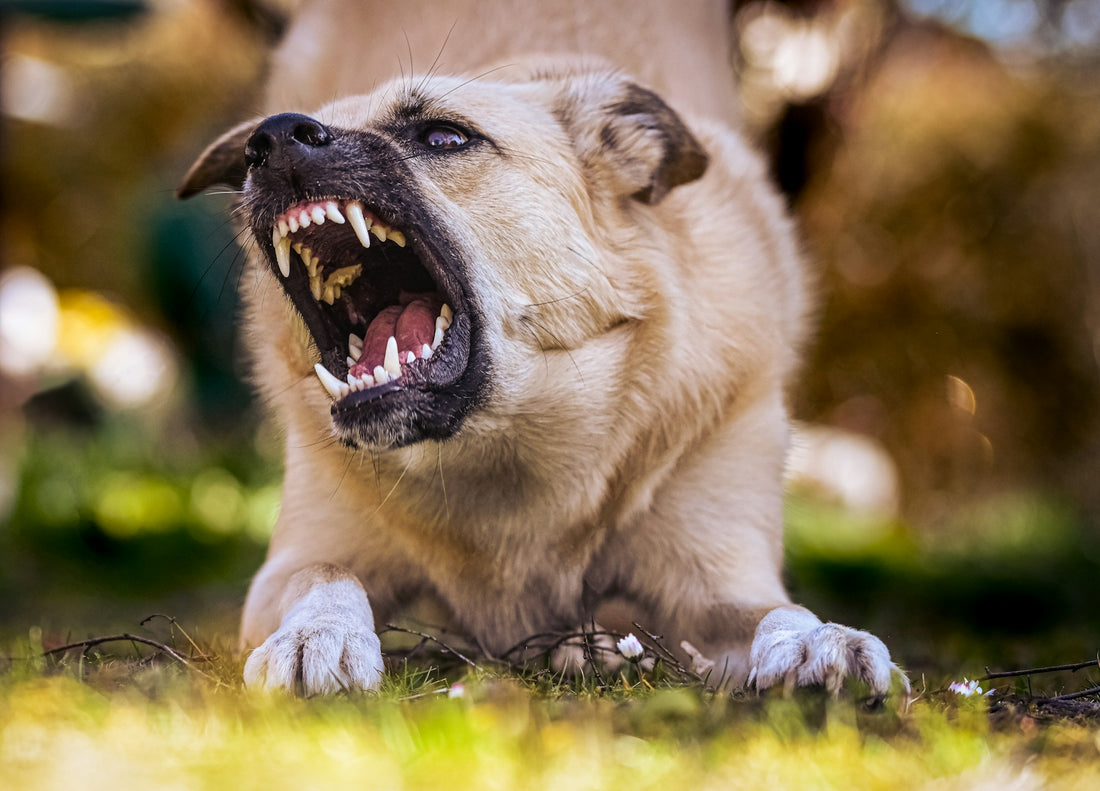

Your adorable furry friend isn't intentionally seeking to display aggression, growl, bite, or snarl at you. Similar to humans, dogs prefer to avoid conflicts whenever they can. When dogs resort to using their "voices," it's often a sign that they feel unheard or pushed beyond their comfort zone. Growling, snapping, or snarling behaviors typically arise when a dog repeatedly experiences communication breakdowns.
But what are these lower levels of communication for dogs? They include subtle signs:
- turning away,
- lip licks,
- squinting eyes,
- avoiding eye contact.
Dogs communicate their discomfort through stiffness, closed mouths, hard stares, and more. It's a complex language that requires our attention. Understanding and accepting your four-legged friend for who they are is the key to socializing an aggressive dog.
Aggressive Dogs and Their Social Problems
We, as responsible dog owners, should appreciate and apologize to our dogs when we've pushed them to growl. Contrary to our immediate feelings, a growl is a positive signal – it's their way of saying, "Hey, please stop that now." Just as we would apologize to a human we unintentionally upset, we should do the same for our furry friends.
Let's think about how to socialize an aggressive dog. Instead of blaming the dog for aggression, let's focus on setting them up for success and fostering open communication. Together, we can create a harmonious relationship based on trust, empathy, and mutual understanding.
Tips for Socializing Your Aggressive Dog
Realize that only you are your dog's family and closest friend. It focuses on your reactions and emotions. And it is normal when a dog differs somewhat in its honor from the standards of dog obedience. After all, you have become the parents of a living individuality, with your problems and challenges, and not a soulless soft toy. The well-being of the dog, which can show aggression, depends on the owner's steps.
- Incremental Acclimatization: An aggressive dog tends to be more sensitive to environmental changes, making it beneficial to introduce new experiences at a moderate pace compared to regular dogs. Begin in a setting with minimal people, sounds, and other triggers, allowing your dog to become accustomed to new situations at a pace that suits them.
- Encouraging Positivity: Think of positive reinforcement as a safe haven for an aggressive dog amidst a world filled with triggers and potential threats. Demonstrate to your furry friend that they will be rewarded for exhibiting good behavior during social interactions. Utilizing treats, praise, and affection serves as a powerful tool to strengthen positive behaviors, helping your dog associate social situations with enjoyable experiences.
- Professional Training: Consider enlisting the help of a professional dog trainer experienced in dealing with aggression. They can assess your dog's behavior, provide tailored training plans, and offer guidance on managing aggression in social settings.
- Structured Playdates: Arrange controlled playdates with other well-behaved dogs. This controlled exposure can help your aggressive dog learn appropriate social cues and behavior through interaction with calm and friendly companions.
- Consistent Commands: Implement consistent commands and cues during socialization exercises. This not only helps in managing your dog's behavior but also establishes a sense of structure and security for them in social situations.
- Patience and Understanding: Socializing an aggressive dog takes time and patience. Understand that progress may be slow, and setbacks can occur. Be patient, stay consistent with training, and celebrate small victories. Believe, and success is sure to await you on the path to how to socialize an aggressive puppy.
What Owners Shouldn't Do For Aggressive Dogs?
In the owner's efforts to socialize an aggressive dog, there are certain "red flags" that will definitely not lead to success:
- Avoid Punishment: Punishing an aggressive dog may worsen their behavior. Instead of addressing the root cause, it can create fear and anxiety, leading to more aggression. Focus on positive reinforcement and redirection instead.
- Skipping Professional Help: Aggression issues can be complex, and seeking professional assistance is crucial. Skipping this step may result in ineffective strategies, hindering the progress of socialization.
- Forceful Approaches: Forcing an aggressive dog into social situations can be counterproductive. It's essential to allow them to approach new experiences voluntarily, minimizing stress and promoting positive associations.
- Disregarding Signals: Be mindful of your dog's body language and indications during socialization. Neglecting signs of distress or unease may intensify aggression. Recognizing and responding to your dog's cues is essential for successful socialization.

Owner's Role in Successful Socialization of an Aggressive Dog
Understanding and addressing your dog's warning signs is crucial! As a responsible owner, it's your role to become a fast-moving ninja, recognizing, acting, and redirecting within seconds to prevent any biting incidents. Even in serious instances like aggressive behaviors, we prioritize the welfare of our furry friends. We view the behavior as a welfare concern, not a part of a training plan.
First and foremost, we investigate whether the dog is in pain or has health conditions contributing to the behavior. Our approach focuses on ethical and humane ways to help them feel safe and meet their needs. No added pain, discomfort, stress, or intimidation.
Gradual exposure to positive experiences, consistent commands, and professional guidance are vital steps in fostering healthier social behaviors. Remember, each dog is unique, so tailor your approach to their specific needs for successful socialization.

